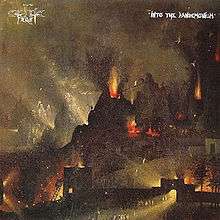Into the Pandemonium
| Into The Pandemonium | ||||
|---|---|---|---|---|
 | ||||
| Studio album by Celtic Frost | ||||
| Released | 1 June 1987 | |||
| Recorded | January–April 1987 | |||
| Studio | Horus Sound Studio, Hannover, Germany | |||
| Genre | Avant-garde metal[1] | |||
| Length | 47:59 | |||
| Label | Noise | |||
| Producer | Celtic Frost | |||
| Celtic Frost chronology | ||||
| ||||
| Professional ratings | |
|---|---|
| Review scores | |
| Source | Rating |
| AllMusic | |
Into the Pandemonium is the third studio album by Swiss extreme metal band Celtic Frost, released in 1987. The album is more varied than many of Celtic Frost's past LPs, with unlikely covers (Wall of Voodoo's "Mexican Radio"), emotionally charged love songs, the album's recurring industrial-influenced rhythmic songs of demons and destruction, traditional Frost-styled songs about dreams and fear, and a dark, classical piece with female vocals.
The album is vastly different from the band's previous work and cemented its late 1980s avant-garde metal term; it is also a departure from the style found on the band's previous albums, Morbid Tales and To Mega Therion that Celtic Frost had become known for. However, it does have the recurring symphonic elements found on previous albums. The album has a more classic heavy metal style within the songs with elements of industrial, classical, gothic rock and doom metal. Eduardo Rivadavia of Allmusic called it "one of the classic extreme metal albums of all time."[1]
The track "Rex Irae" is the opening part of Celtic Frost's requiem; the third, concluding part of which, "Winter (Requiem, Chapter Three: Finale)" can be heard on 2006's Monotheist. The second part of the requiem was never released by the band.
"Inner Sanctum" was featured in the 2009 video game Grand Theft Auto IV: The Lost and Damned.
Lyrics
Some of the lyrics are silently borrowed from other sources. For example, significant portions of Inner Sanctum are directly quoted from Emily Brontë poems,[3] while the lyrics to "Tristesses de la lune" are borrowed from the poem of the same name in Charles Baudelaire's Les Fleurs du mal. The lyrics to "Sorrows of the Moon" are an English translation of the same.
Album art
The cover image is a detail from the right (Hell) panel of The Garden of Earthly Delights, a triptych painted in 1504 by Hieronymus Bosch, now part of the permanent collection at the Prado in Madrid.
Original LP track listing (Original CD featured different track listing from LP)
| Side One | |||
|---|---|---|---|
| No. | Title | Writer(s) | Length |
| 1. | "Mexican Radio" (Wall of Voodoo cover) | Marc Moreland, Stan Ridgway | 3:28 |
| 2. | "Mesmerized" | Martin Eric Ain, Thomas Gabriel Warrior | 3:24 |
| 3. | "Inner Sanctum" | Warrior, Ain | 5:14 |
| 4. | "Sorrows of the Moon" | Ain | 3:04 |
| 5. | "Babylon Fell" | Warrior | 4:18 |
| Side Two | |||
|---|---|---|---|
| No. | Title | Writer(s) | Length |
| 1. | "Caress into Oblivion" | Warrior | 5:10 |
| 2. | "One in Their Pride" | Warrior | 2:50 |
| 3. | "I Won't Dance" | Warrior | 4:31 |
| 4. | "Rex Irae (Requiem)" | Warrior | 5:57 |
| 5. | "Oriental Masquerade" | Warrior | 1:15 |
Remastered CD edition track listing
| No. | Title | Length |
|---|---|---|
| 1. | "Mexican Radio" | 3:28 |
| 2. | "Mesmerized" | 3:24 |
| 3. | "Inner Sanctum" | 5:14 |
| 4. | "Tristesses de la Lune" | 2:58 |
| 5. | "Babylon Fell (Jade Serpent)" | 4:18 |
| 6. | "Caress into Oblivion (Jade Serpent II)" | 5:10 |
| 7. | "One in Their Pride (Porthole Mix)" | 2:50 |
| 8. | "I Won't Dance (The Elders' Orient)" | 4:31 |
| 9. | "Sorrows of the Moon" | 3:04 |
| 10. | "Rex Irae (Requiem)" | 5:57 |
| 11. | "Oriental Masquerade" | 1:15 |
| 12. | "One in Their Pride (Re-entry Mix)" | 5:52 |
| 13. | "In the Chapel in the Moonlight [bonus track]" | 2:04 |
| 14. | "The Inevitable Factor [bonus track]" | 4:38 |
| 15. | "The Inevitable Factor (Alternate Vox) [bonus track]" | 4:38 |
Credits
- Thomas Gabriel Warrior - Guitars, Vocals
- Martin Eric Ain - Bass
- Reed St. Mark - Drums
Guest musicians
- Thomas Berter: Backing vocals (track 1)
- Claudia-Maria Mokri: Backing vocals (tracks 2, 5, 10)
- Manü Moan: Vocals (track 4)
- Malgorzata Blaiejewska Woller: Violin (tracks 4, 10, 11)
- Eva Cieslinski: Violin (tracks 4, 10, 11)
- Wulf Ebert: Cello (tracks 4, 10, 11)
- Jürgen Paul Mann: Viola (tracks 4, 10, 11)
- Lothar Krist: Conductor (tracks 4, 10, 11)
- Jan Nemec: Sample editing (track 7), engineer
- H.C. 1922: Backing vocals (track 8)
- Andreas Dobler: Guitars (track 9, 10, 14)
- Anton Schreiber: French horn (tracks 10, 11)
- Marchain Regee Rotschy: Backing vocals (track 13)
References
- 1 2 Rivadavia, Eduardo. "Celtic Frost: Artist Biography". Allmusic. Retrieved 1 November 2014.
On To Mega Therion, Warrior had begun experimenting with different musical styles (especially classical music and electronica), leading certain journalists to describe the band's direction as 'avant-garde' metal. Released in 1987, Into the Pandemonium would substantiate these claims and then some, introducing an unconventional collision of death metal brutality and symphonic overtones on its way to becoming one of the classic extreme metal albums of all time.
- ↑ Raggett, Ned. "Celtic Frost Into the Pandemonium review". AllMusic. Rovi Corporation. Retrieved 2011-12-24.
- ↑ Hatfield, C. W. The Complete Poems of Emily Jane Brontë, page 54. Columbia University Press, 1941.